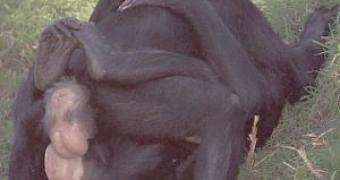Chimpanzees have been regarded for long as the most intelligent apes, but a new research revealed that their close relative, the bonobo (also wrongly named pygmy chimpanzee) was found to outperform the chimpanzees in cooperative behavior, even if scientists would have bet on chimps due to their complex strong cooperative hunting behavior in the wild.
Bonobos were found much more successful than chimpanzees at cooperating to get food.
A team led by Brian Hare of the Max Planck Institute for Evolutionary Anthropology and Duke University found that the aggressive nature of the chimpanzee, manifested from sexual competition for females can be tricky when the individuals face specific situations, like sharing a food resource.
Before the experiments, scientists took in consideration two hypotheses.
The first, named "emotional reactivity hypothesis," foresaw that bonobos will be more cooperative as observations point out that they are less aggressive towards other individuals than are chimpanzees.
Primatologists have often noted nasty, competitive behavior among power-hungry chimps and bonobos have a reputation as free-loving peaceniks.
In fact, bonobos display significantly more socio-sexual and play behavior than chimps and are known to solve any conflict by sex, not violence, and from time to time, real orgies trigger in the bonobo groups, with individuals of any sex and age being involved.
The other hypothesis supported the chimps based on their ability ("hunting hypothesis").
The first hypothesis proved the valid one.
Two bonobos were more likely to both eat when they were served food (fruits) in a single dish than were chimpanzees confronted with the same situation.
Bonobo pairs reacted by playing with each other and even rubbing genitals--a frequent stress-reliever in bonobo society.
They also shared the bounty more often than not.
Chimps, on the other hand, generally avoided their partner and shared food less than half of the time.
In other experiments, bonobos performed better than chimpanzees at cooperating (e.g., by simultaneously pulling a rope) to get to the food that was not easily divisible, thus that could be easily monopolized by one of the two individuals.
And when the chimps did cooperate, they almost always adopted a winner-take-all mentality, with one animal hogging the entire bounty.
Indeed, the ability of bonobos to tolerate the presence of one another in feeding contexts was crucial in their success.
The chimps' cooperative hunting skills prove to be of no use when food wasn't easily divisible.
The new research provides not only a comparison of social tolerance and cooperation in bonobos and chimpanzees, but shed a light on how our behavior evolved, as these species are man's closest relatives, with only 4 million years of split from a common ancestor.
The skill of solving social problem seems to be determined through evolutionary selection on controlling emotional systems, like fear and aggression, something at which bonobos are better.
By sex.
The discoveries "open a bit of a door on the bonobo mind that we didn't have before," says Frans de Waal, a primatologist at Emory University in Atlanta, Georgia.
"Although field studies have found little evidence of cooperative behavior in wild bonobos, it may simply be that their lush forest habitat provides enough easily accessible food that teamwork isn't necessary," said de Waal.
"We often look to chimps for clues to human behavior, but this study shows another side to our primate ancestry."

 14 DAY TRIAL //
14 DAY TRIAL //